In Sir William Dargie’s portrait, celebrated Western Arrernte/Aranda/Arrarnta artist Albert Namatjira (1902–1959) is painted in profile, seated on a rock, looking out across the blazing colours and ancient rock formations of his Country; landscapes he famously rendered in watercolour. Namatjira was born at Ntaria/Hermannsburg near Mparntwe/Alice Springs. His distinctive style, though often reductively perceived as consistent with a traditional Western landscape aesthetic, was rooted in deep ancestral connection and knowledge of the Lands spanning his father’s Country around the MacDonnell Ranges and his mother’s Country in the region of Palm Valley in Central Australia. Exhibiting from 1938 to great acclaim and working prolifically, demand for his paintings increased during the 1940s. Though Namatjira was well known by the 1950s, his life and career were impacted by widespread prejudice and inequality, and an Australian constitution that did not recognise First Nations people. It is a stark fact that Namatjira was the first Aboriginal or Torres Strait Islander person to receive citizenship in 1957. Even so, restrictions on his family and his community remained engrained and complex, ultimately leading to his death in 1959. Another portrait of Namatjira painted by Dargie won the Archibald Prize in 1965 – the first time the winning work featured a First Nations subject.
Purchased with funds provided by Marilyn Darling AC and with the assistance of Philip Bacon Galleries 2000
© Roger Dargie and Faye Dargie
The portrait is of Albert Namatjira by William Dargie, made in 1958 using oil paint on canvas laid on composition board and measuring 76 cm high by 61cm wide.
The Arrernte artist Albert Namatjira is depicted in a desert landscape, sitting calmly on a rock holding one of his own paintings. His figure takes up most of the composition against a distant desert background.
The bright blue desert sky fills the top two thirds of the background around and above Namatjira. In lively and breezy, mostly vertical, strokes, the painted sky starts in bold cerulean at the top of the painting and fades to sapphire and powder blue where it meets the distant purple mountains. Some horizontal paint strokes hint at faint clouds.
Land occupies the lower third of the background. In the far distance a blurred mountain range of purples and dark blue runs along the horizon. The flat dirt is rendered in pale peachy oranges. Small blue green dashes and dots of paint suggest sparse and distant vegetation.
Namatjira's seated figure, cropped at the shins, fills the foreground. His head is positioned in profile facing the left. His skin is warm shades of dark brown and umber. He has short black hair, thick and wavy, flecked with grey, which neatly follows the shape of his large ear. His forehead angles diagonally toward his prominent brow, creased gently with wrinkles. He has a bushy raised eyebrow, and deeply set brown eye gazing into the distance. His nose is straight and upturned, his mouth slightly open. He has strong cheekbones leading to plump jowls and a thick neck, around which sits a thin red bandana tucked into his white button-up shirt.
Namatjira's body is turned slightly towards the left, following his gaze. His left arm is bent at the elbow, the forearm leaning casually on his left thigh, his hand and fingers gently hanging down. Between this hand and his raised right hand, he gently holds a sketch of a landscape, resting on his lap, and angled away from his body. The paper faces towards us directly, showing a watery sketch of a landscape scene. A large tree on the right with grey green foliage, bright blue mountains in the background and pale peachy orange dirt in the foreground.
Namatjira has dark taupe pants, his knees are parted, and he sits on a low reddish-brown rock.
Audio description written by Marina Neilson and voiced by Lucie Shawcross, 2021



On one level The Companion talks about the most famous and frontline Australians, but on another it tells us about ourselves.
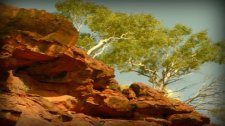
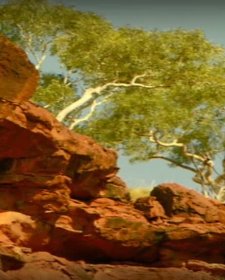
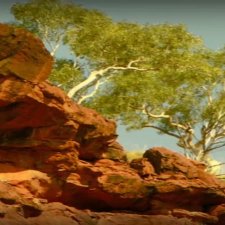
The art and landscape of Albert Namatjira.
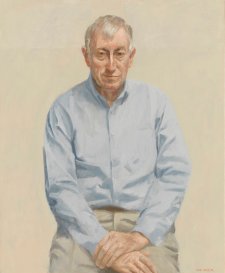
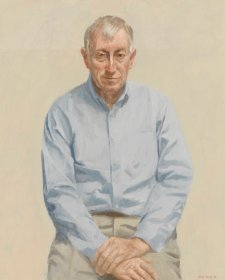
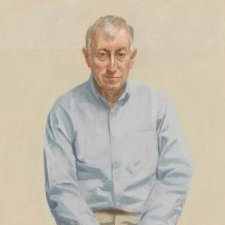
Scientists tend to conjure up images of men in white coats in labs but this is just one stereotype in an evolving history of how we have perceived scientists, and how their profession has been understood over the years.